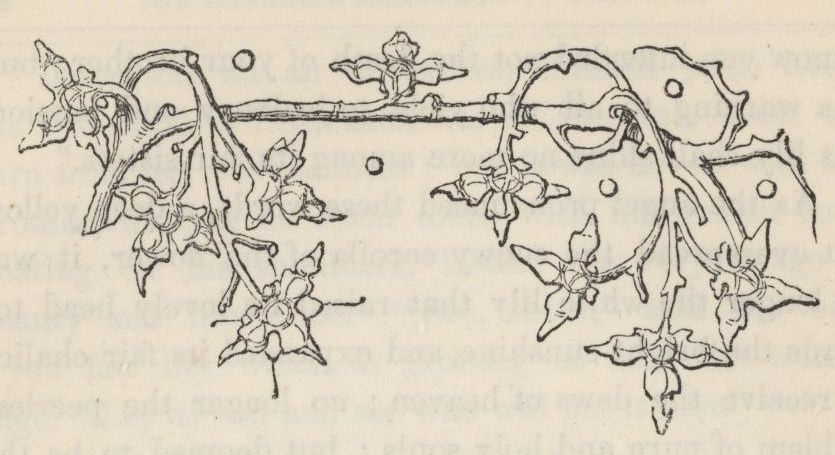






The ancients pretended that Narcissus was a youth
who, having beheld his own image reflected in a brook,
was so enamoured of himself that, entirely occupied in
gazing at his own perfections, he neglected every other
employment, pined away, and would have died, had not
the compassionate deities transformed him into the flower
which bears his name.
Does not this fable point to those who are too fond
of their looking-glasses? It also contains an admonition
to those selfish persons who, in love with themselves,
and wholly engrossed with the idea of their own excellence,
think not of the virtues or the claims of others.
The Nasturtium, which grows in such profusion during the summer months, but dies away at the approach of winter, may well be compared to the world, which fawns and flatters while it thinks us capable of satisfying its demands; but when the clouds of misfortune overshadow us, it withdraws its fickle affection, to bestow it upon some other object.
The azure hues which this sweet flower seems to have stolen from the blue skies above us, recall to our thoughts that bright land to which we are wont to look with love and hope. It tells us that even on earth we may find some ray of Heaven’s colours, some gleam of its felicity, if we love and seek Him who is the joy of the blessed.
The Nettle is a worthy type of those extremely sensitive people who resent the least wound to their feelings, even when given unintentionally or from mistaken kindness. Such persons sting even their best friends. The Nettle destroys the flowers that grow near it; and thus do those people drive away from them all who would render them a service, and, like that weed, they live in solitude, unnoticed and unloved.
In the garden where the Saviour poured forth His
midnight prayer, there bloomed a flower which, sleeping
not while the blossoms round it slept, heard His words
of love and sorrow, and witnessed the agony of His Sacred
Heart.
Thenceforward the fair flower no more unclosed to
the glare of day; but in the still hours of night, when
the stars watch in heaven, the Cereus, with loving
fidelity, expands its snowy petals, as if it watched and
waited for the voice of Jesus.
Sweet flower, true emblem of the Faithful Companion
of Jesus, who, heedless of all that the world
holds dear, and closing her heart to all but her Lord,
loves to watch with Him, to share His labours and His
sufferings, and to commune with His most Sacred Heart.
